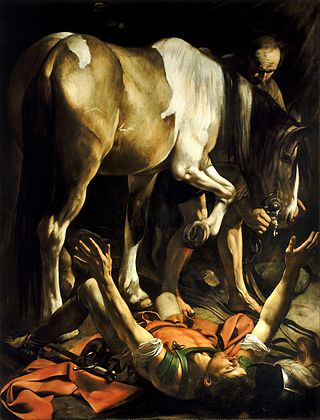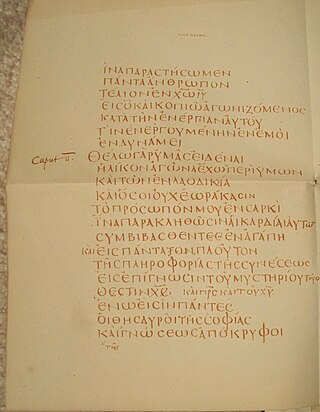Related Research Articles

The Epistle to the Colossians is the twelfth book of the New Testament. It was written, according to the text, by Paul the Apostle and Timothy, and addressed to the church in Colossae, a small Phrygian city near Laodicea and approximately 100 miles (160 km) from Ephesus in Asia Minor.

An epistle is a writing directed or sent to a person or group of people, usually an elegant and formal didactic letter. The epistle genre of letter-writing was common in ancient Egypt as part of the scribal-school writing curriculum. The letters in the New Testament from Apostles to Christians are usually referred to as epistles. Those traditionally attributed to Paul are known as Pauline epistles and the others as catholic epistles.
Frank Stagg was a Southern Baptist theologian, seminary professor, author, and pastor over a 50-year ministry career. He taught New Testament interpretation and Greek at New Orleans Baptist Theological Seminary from 1945 until 1964 and at the Southern Baptist Theological Seminary in Louisville, Kentucky from 1964 until 1978. His publications, recognitions and honors earned him distinction as one of the eminent theologians of the past century. Other eminent theologians have honored him as a "Teaching Prophet."
No one...has ever taken the New Testament more seriously than Frank Stagg, who spent his entire life wrestling with it, paying the price in sweat and hours in an unrelenting quest to hear the message expressed in a language no longer spoken and directed toward a cultural context so foreign to the modern reader.

The Pauline epistles, also known as Epistles of Paul or Letters of Paul, are the thirteen books of the New Testament attributed to Paul the Apostle, although the authorship of some is in dispute. Among these epistles are some of the earliest extant Christian documents. They provide an insight into the beliefs and controversies of early Christianity. As part of the canon of the New Testament, they are foundational texts for both Christian theology and ethics.

The Pauline epistles are the thirteen books in the New Testament traditionally attributed to Paul the Apostle.
Donald Guthrie was a British New Testament scholar, best known for his New Testament Introduction (1962) and New Testament Theology (1981) which are recognized as significant books related to the New Testament.
Charles Rosenbury Erdman Sr. (1866-1960) was an American Presbyterian minister and professor of theology at Princeton Theological Seminary.
Kenneth Schenck is a New Testament scholar whose primary focus has been the book of Hebrews, although he has also published on Paul, Philo, philosophy, and the New Testament in general. His New Testament Survey has sold over 10,000 copies, and his “brief guide” to Philo has been translated into Russian, Korean, and Hungarian. He has also written a philosophy textbook. His blog also engages heavily with issues in hermeneutics, ecclesiology, and philosophy on both a popular and scholarly level.
The New International Commentary on the New Testament is a series of commentaries in English on the text of the New Testament in Greek. It is published by the William B. Eerdmans Publishing Company. The current series editor is Joel B. Green.
Bob Utley is a contemporary Bible teacher who is best known for his commentary series that covers the Old and New Testaments.
David E. Garland served as the interim president of Baylor University in Waco, Texas. His term began in June 2016 amid the Baylor sexual assault scandal and resignation of former president Ken Starr. Garland's term concluded on May 31, 2017.
Pheme Perkins is a Professor of Theology at Boston College, where she has been teaching since 1972. She is a nationally recognized expert on the Greco-Roman cultural setting of early Christianity, as well as the Pauline Epistles and Gnosticism.

William L. Lane was an American New Testament theologian and professor of biblical studies.
Ralph Philip Martin was a British New Testament scholar.

Colossians 3 is the third chapter of the Epistle to the Colossians in the New Testament of the Christian Bible. Traditionally, it is believed to have been written for the churches in Colossae and Laodicea by Apostle Paul, with Timothy as his co-author, while he was in prison in Ephesus, although there are debatable claims that it is the work of a secondary imitator, or that it was written in Rome. In the previous chapter, Paul has reminded the people that they no longer "belong to the world", but they are to live in intimate union with Christ, and this chapter contains his advice how he wants the Colossians to live.

Colossians 4 is the fourth chapter of the Epistle to the Colossians in the New Testament of the Christian Bible. Traditionally, it is believed to have been written for the churches in Colossae and Laodicea by Apostle Paul, with Timothy as his co-author, while he was in prison in Ephesus, although there are debatable claims that it is the work of a secondary imitator, or that it was written in Rome. This chapter contains the final exhortations and greetings.

2 Timothy 4 is the fourth and final chapter of the Second Epistle to Timothy in the New Testament of the Christian Bible. The letter is traditionally attributed to Paul the Apostle, the last one written in Rome before his death, addressed to Timothy. Some scholars argue that it is the work of an anonymous follower, after Paul's death in the first century AD. This chapter contains intensely personal material, more so than elsewhere in the pastoral epistles, in relation to Paul's imminent death, ending with personal comments and salutations.
E. Elizabeth Johnson is an American New Testament scholar and the J. Davison Philips Professor of New Testament at Columbia Theological Seminary. She is widely known for her writings on the New Testament, specifically the Pauline Letters.
Markus Barth was a Swiss scholar of theology. He lived in Bern, Basel, Berlin, and Edinburgh and was the son of the seminal Protestant theologian Karl Barth. From 1940 to 1953 he was a Reformed Pastor in Bubendorf near Basel. In 1947 he received a doctorate in New Testament from the University of Göttingen. Between 1953 and 1972 he held professorships in New Testament at Dubuque Theological Seminary, University of Chicago Divinity School, and Pittsburgh Theological Seminary. From 1973 to 1985 he was professor of New Testament at the University of Basel.
Todd Dixon Still is an American New Testament scholar and serves as the Charles J. and Eleanor McLerran DeLancey Dean and the William M. Hinson Professor of Christian Scriptures at the George W. Truett Theological Seminary of Baylor University. He is also a licensed and ordained Baptist minister.
References
- ↑ "BMH Books - Kent, Homer A. Jr". Archived from the original on November 11, 2010. Retrieved November 11, 2010.
- ↑ "Zondervan - Homer A. Kent". Archived from the original on November 19, 2011. Retrieved November 11, 2010.